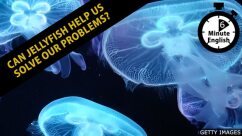Neil
Hello. This is 6 Minute English from BBC Learning English. I’m Neil.
Georgina
And I’m Georgina.
Neil
That’s a big smile on your face, Georgina! You seem happy today!
Georgina
I am, Neil. After all, what’s the point in seeing the glass half empty?
Neil
Ah, so you’re someone who tries to see the glass half full – you generally look at
things in a positive way.
Georgina
I hope so! It may seem strange to be discussing happiness in the middle of a
global pandemic but right now feeling happy is more important than ever.
Neil
Well then, it’s lucky that happiness is the subject of this programme, Georgina.
And while many things seem to be out of our control just now, there are small
things we can do to feel better about life…
Georgina
…to feel less stressed, and maybe even a little happier.
Neil
You’re talking like a Dane now, Georgina. Denmark, and in fact all the Nordic
countries, are often listed as among the happiest places in the world.
Georgina
You know what would make me happy, Neil? – asking me a really good quiz
question.
Neil
OK. Well, did you know that every year the UN publishes its Global Happiness
Survey revealing the happiest countries in the world? It’s based on factors like
income, life expectancy and health. The Nordic countries often come in the top
ten, but which country was rated the happiest in 2020? Was it:
a) Iceland?,
b) Denmark?, or
c) Finland?
Georgina
Well, Neil, Denmark is famous for bacon, and nothing makes me happier than a
bacon sandwich, so I’ll say b) Denmark.
Neil
I like your thinking, Georgina! We’ll find out the answer later, but you’re certainly
right to say that Denmark is considered one of the happiest countries in the
world.
Georgina
Malene Rydahl, author of the bestselling book, Happy as a Dane, believes that
aspects of Danish culture can help us improve our chances of happiness.
Neil
Here she is explaining what happiness means for her to BBC World Service
programme, The Conversation. See if you can hear what she thinks:
Malene Rydahl
Well, I think we should be seeking alignment and I think we should practise
gratitude and I think that we should be more conscious about how we relate to
things that happen to us and how much we compare ourselves to others… I do
think that what we need to focus on is the quality of our relationships.
Georgina
Did you hear Malene use the word alignment? She thinks there should be
harmony between my true sense of who I am, what I think and how I relate to
others. We should be in alignment – or in the correct relation, to those things.
Neil
Malene also thinks happiness comes from gratitude – feeling grateful and
expressing thanks to other people.
Georgina
She recommends finding three things, no matter how small, to be grateful for
every day.
Neil
Like… getting a good night’s sleep, drinking a hot coffee… and having this chat
with you, Georgina.
Georgina
Thanks, Neil, that’s put a smile on my face! It may sound strange but doing this
every day can really boost your happiness levels.
Neil
Malene also warns against seeking happiness in external things, as you can hear
in this chat with BBC World Service’s, The Conversation:
Malene Rydahl
If you seek happiness and you mistake it for pleasure, you will be running around
like a little hamster in a wheel because it’s never enough and because you will be
very quickly the victim of the hedonic treadmill… and the hedonic treadmill is…
you know, you want something, you think if you’re more beautiful, if you get
more power, if you get more money and fame and then you’ll finally be happy…
and then you get it and you get a small satisfaction.
Neil
According to Malene, chasing external pleasures like money and fame will leave
you feeling like a hamster on a wheel – like someone who’s always busy but
never accomplishes anything useful or finishes what they start.
Georgina
She also says it’s easy to become a victim of the hedonic treadmill. This is the
idea that humans adapt to whatever level of happiness they achieve. As we make
more money, meet the perfect boyfriend or whatever we desire, our expectations
also increase, so we never find the happiness we hoped we would!
Neil
‘Money can’t buy happiness’, as my grandma used to say.
Georgina
Right. In fact, it’s probably the quality of our relationships, not external objects,
that gives satisfaction – the pleasure we feel when we achieve something we
wanted to.
Neil
Lots of useful tips there, Georgina, for feeling as happy as a Dane.
Georgina
A Dane, you say, Neil? So I got the correct answer?
Neil
In my quiz question I asked Georgina which Nordic country was rated happiest in
the UN’s 2020 global survey.
Georgina
I guessed, b) Denmark.
Neil
But in fact, Georgina, it was… c) Finland. I guess their bacon sandwiches are even
better!
Georgina
OK, let’s recap the vocabulary and start seeing the glass half full – looking at
things in a positive way.
Neil
Happiness might be all about alignment – being in the correct relation to things.
Georgina
Or gratitude – being grateful and giving thanks.
Neil
Feeling like a hamster on a wheel means you’re always busy doing things but
without getting satisfaction - the pleasant feeling of achieving something you
really wanted to.
Georgina
Finally, the reason happiness often escapes us may involve the hedonic treadmill
- the human tendency to return to the same level of happiness after something
very good or very bad has happened.
6 Minute English ©British Broadcasting Corporation 2021
bbclearningenglish.com Page 5 of 6
Neil
That’s all for this programme. We hope it’s lifted your spirits and given you some
useful vocabulary as well.
Georgina
Remember to join us again soon for more interesting topics here at 6 Minute
English. And if you like topical discussions and want to learn how to use the
vocabulary found in headlines, why not try out our News Review podcast? You’ll
find programmes about many topics that will help to keep you entertained and
learning at the same time. Don’t forget you can download the app for free from
the app stores. And of course, we are on most social media platforms. Bye for
now!
Neil
Bye!
VOCABULARY
the glass is half full/empty
used to say that someone has a tendency to look at situations in a positive or
negative way
alignment
correct position in relation to something else
gratitude
feeling grateful, expressing thanks to another person
hamster on a wheel
someone involved in activities that make them busy all the time but without ever
achieving anything important or managing to finish a task
satisfaction
the pleasure you feel when you do something you wanted to do, or get
something you wanted to get
hedonic treadmill
the human tendency to return to the same level of happiness after something
very good or very bad has happened









